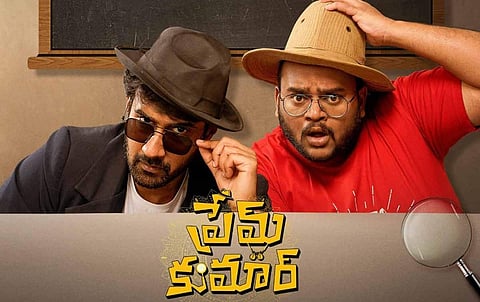Prem Kumar Movie Review: Little to love in this romantic drama
Rating:(2 / 5)
How far can you really twist a boy-meets-girl story? Add the passage of time, the ebb and flow of contemplation, some misunderstandings, and some good ol' regret to the mix, you might just have plenty. Prem Kumar, Santosh Shoban's latest film, is bookended by a wedding. Doffing a hat to how weddings have been the scene of choice for a climactic showdown in Telugu films across decades, with the equally stereotypical shubham
Director - Abhishek Maharshi
Cast - Santosh Shoban, Rashi Singh, Krishna Chaitanya, Ruchitha Sadineni, Sudarshan
Atleast money begins to come his way when he decides to utilise his lack of expertise in the getting-married department (which obviously means developing a simultaneous expertise in the 'women-are-full-of-BS' department) and soon enough, Prem and his friend start an agency to help people break relationships. The glee and ease with which they help distressed men find freedom comes to a grinding halt when Prem confronts his past and the rest of the film rolls into a comedy of errors, think Ante Sundaraniki meets Chandamama.
Prem Kumar is filled, overflowing even with dialogues, dialogues, and more dialogues that betray the norms of brevity and pace. It leaves you annoyed first, then numb. There is nothing inherently wrong with adopting a dialogic format, especially one that comes with good doses of heavy-fisted humor, but it is only ironic that the humour added in the dialogues to make the film more accessible renders it inaccessible to the viewer. Santosh Shoban is quite good, in moments where he is required to be both vulnerable and funny, but he finds very little support in the film's screenplay or his love interest Nethra (an unresponsive Rashi Singh), who he keeps pining for. Sure, this man who keeps saying "feeling ah? I have no feelings" had his heart melt, his hope rise a little at the sight of this woman, whom he met at an arranged marriage set-up, but wouldn't his character arc be better off if he was established with a single "altar-leaving" moment, as opposed to say a montage full of 'em?
But the screenplay at least throws an arc or two for Prem and Nethra. Angana and 'Rising Star' Roshan don't even get that. They are forced to ham their way through some all-too-familiar rich bimbo/rich himbo stereotypes. Angana, played by a fairly confident Ruchitha Sadineni actually gets a decent introduction scene. You know she wants to be taken seriously and refuses servility when she shuts off people who call her ma'am. She goes on to ask a prospective wedding planner to quote a higher amount. But that is where anything noteworthy about Angana ends. The rest of the time you are left wondering if Angana is a real name or are we just looking at a certain Bollywood actor's name with one letter off.
While people often like to look at massive budget star vehicles to understand how mainstream Telugu film works, one can equally gleam some inputs on what 'mainstream' is in the way some of the tropes and supposedly bankable and risk-free storytelling Tollywood-isms trickle down to its smaller films. While there is a good chance that bigger films can get away from things smaller films can never escape from…smaller films definitely don't get away from things that even bigger films cannot get away from. After all, life may or may not offer a shubham card. But cinema does.

